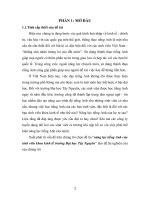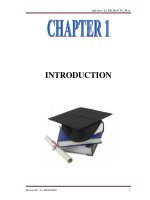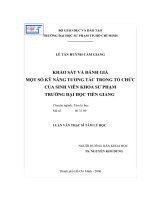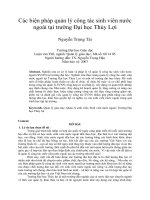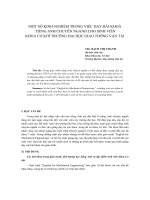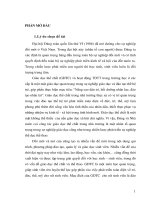Những thử thách sinh viên khoa ngoại ngữ trường đại học lạc hồng
Bạn đang xem bản rút gọn của tài liệu. Xem và tải ngay bản đầy đủ của tài liệu tại đây (357.5 KB, 54 trang )
MINISTRY OF EDUCATION AND TRAINING
LAC HONG UNIVERSITY
FACULTY OF FOREIGN LANGUAGES
Y Z
Some Challenges English
Majors at Lac Hong
University Often Encounter
W
hen Bein
g
Tau
g
ht B
y
NESTs
December 2009
Advisor: Nguyen Ngoc Yen, M.A
Student: Duong Viet Ngoc Oanh
Class: 05AV3
Some challenges English Majors often encounter when being taught by NESTs 12/2009
Student: Duong Viet Ngoc Oanh Page i
ACKNOWLEDGEMENT
First of all, deep in my heart I would like to express my special thanks to Ms.
Nguyen Ngoc Yen – my advisor who gave her time for useful advice, great
guidance and precious materials as well as always encouraging me to complete
the research.
I would also like to say grateful thanks to all the Faculty of the Foreign
Languages and those who taught me in the past four years at Lac Hong
University.
Moreover, I am very grateful for their cooperation and support. First, all of the
students of day-time classes batch 2006 for their willingness to complete the
questionnaire. My thanks also go to all the students of classes 07AV111,
07AV112, 07AV113 who were kind enough to spend their time for the
interview. In addition, my great appreciation is for all the native teachers in
VMG, in VUS foreign language centers as well as Mr. Tompkins from
UNESCO. Especially, I do appreciate the kindness of Mr. Denis Voight and
Mr. Daniel Caroll who have their own experience in teaching English majors at
Lac Hong University. Their willingness to complete the questionnaire and be
interviewed was very helpful and appreciated.
Finally yet importantly, I would like to thank my family and friends who give
me a strong warm spirit to cope with any troubles I faced when reaching my goal
of completing the research.
Some challenges English Majors often encounter when being taught by NESTs 12/2009
Student: Duong Viet Ngoc Oanh Page ii
ABSTRACT
The research paper aims to figure out some challenges English majors at Lac Hong
University often encounter in NESTs’ (Native English Speaking Teachers) classes.
The intention is that both English majors and NESTs are aware of potential problems
in advance to work more constructively. With this practical aim, the writer tries to
point out some differences in linguistics, which make students afraid to talk to NESTs.
The paper also draws attention to providing as much information as possible about the
differences in working habits between NESTs and Vietnamese students. At the same
time, it also draws focus to students’ purposes in learning English. Finally, some
suggestions are given to English majors at Lac Hong University as well as to NESTs
who want to teach English as a foreign language to Vietnamese students. There are
also some suggestions for the Faculty of Foreign Languages to create the best
environment for study for English majors.
Some challenges English Majors often encounter when being taught by NESTs 12/2009
Student: Duong Viet Ngoc Oanh Page iii
TABLE OF CONTENTS
٭٭٭٭٭٭٭٭
Page
Acknowledgements i
Abstract ii
Table of Contents iii
Chapter 1: INTRODUCTION 1
1.1. Background of the Study 2
1.2. Statement of the Problems 3
1.3. Justification 4
1.4. The Scope of the Study 5
1.5. The Research Question 6
1.6. Hypothesis 6
1.7. Organization of the Research 6
Chapter 2: LITERATURE REVIEW 8
2.1. Definition of the Term Native Speakers 9
2.2. A Review of Previous Studies Related to the Problem 10
Chapter 3: METHODOLOGY AND PROCEDURE 13
3.1. Description of population 14
3.2. Research Instruments 15
3.2.1. Questionnaire 15
3.2.1.1. Questionnaire for English majors 15
3.2.1.1. Questionnaire for NESTs 15
3.2.2. Interview 16
3.2.3. Observation 16
3.3. Research Procedure 17
Chapter 4: FINDINGS AND DISCUSSIONS 18
4.1. How Well English Majors Can Understand NESTs’ Lectures 19
4.2. Problems in Communication 23
Some challenges English Majors often encounter when being taught by NESTs 12/2009
Student: Duong Viet Ngoc Oanh Page iv
4.3. Differences in Learning Attitude 26
4.4. Differences in Working Habit 29
Chapter 5: CONCLUSION AND RECOMMENDATIONS 33
5.1. Conclusion 34
5.2. Recommendations 35
5.2.1. Recommendations for English majors 35
5.2.2. Recommendations for NESTs 36
5.2.3. Recommendations for the Faculty of Foreign Languages 37
5.2.4. Recommendations for Further Studies 37
REFERENCES 38
Appendix 1: Questionnaire for English Majors 39
Appendix 2: Questionnaire for NESTs 42
Appendix 3: Interview questions for English Majors 44
Appendix 4: Interview questions for NESTs 44
Appendix 5: Result of Questionnaire 45
Some challenges English Majors often encounter when being taught by NESTs 12/2009
Student: Duong Viet Ngoc Oanh Page 1
CHAPTER 1
INTRODUCTION
Some challenges English Majors often encounter when being taught by NESTs 12/2009
Student: Duong Viet Ngoc Oanh Page 2
1.1. Background of the Study
Crystal (1987, cited in Medgyes 1992:1) once contented that a great number of people
who speak English as their mother tongue, as a second language or foreign language
has risen by 40% since the 1950s. Moreover, in Medgyes’ paper (1992) he gave a
point of the conservative estimates that “English is the official or semi-official
language in more than 60 countries over the six continents.” Medgyes also noted
Kachu’s words (1982) that if the trend goes on continuously by the end of the 20
th
century the number of people who speak English as their mother tongue will be less
than the number of people who use English as second or foreign language.
Actually, English has become the primary language in many fields for communicating
all over the world such as scientific, industry, commerce, mass media, sport,
transportation, etc…. In fact, “English is a precondition for countries to gain access to,
or remain in the mainstream of global communication.” (Medgyes, 1992) Thus,
millions of young people spend thousands of hours trying to learn English. The ability
to speak and write English is considered to be a passport for them to get better jobs in
the future.
Hence, the demand of learning English is higher and further than the supply. Catching
the need of learners, many foreign language centers, colleges and universities invite
Native English Speaking Teachers (NESTs) in great numbers because NESTs can
draw the attention from students as they really trust to NESTs. (Medgyes, 1992)
NESTs provide English learners the way to use the right vocabulary in real contexts,
sentences. Though there are a number of dictionaries to show learners the correct use
of vocabulary, they do not show whether a word should be used appropriately in a
certain situation (Medgyes, 1992). In addition, English learners can approach and
imitate the oral fluency from NESTs as well as their beautiful intonation. However,
how to gain those benefits from NESTs is still a great challenge to students.
Some challenges English Majors often encounter when being taught by NESTs 12/2009
Student: Duong Viet Ngoc Oanh Page 3
Recently, English majors at Lac Hong University have had many chances to be taught
by NESTs in many subjects such as speaking, pronunciation, cross culture, etc…
Nevertheless, looking back on the writer’s survey, there are some challenges English
majors have to face to when being taught by NESTs. Only 1% out of 90 respondents
noted in the questionnaire that he could understand completely his NESTs’ lectures
while 14% claimed that they could not understand anything from NESTs’ lectures.
This figure shows an alarm to the writer to seek for the reasons why English majors
could not understand their NESTs’ lectures.
1.2. Statement of the Problems
It is true that English majors find it quite challenging to understand their NESTs’
lectures at the first few times. Though they have learned English from secondary to
high school, they were asked to focus on grammar and comprehension only. They may
know well the rules of English grammar but it is not likely that they know the way to
give appropriate responses in a real conversation (Vietnam Reader, 1996). As a result,
their listening and speaking skills are unqualified to understand native speakers.
Students have to take time to get familiar with the real native accents from their
NESTs as most of the students have few chances to talk to native speakers before. In
addition, the role of culture also plays an important element in the classroom. Because
NESTs and students do not share the same language and culture, it must be a barrier
for them in teaching and learning.
NESTs are able to provide more information about an English speaking country’s
culture but they cannot give students little advice about the process of language
learning, as they are not learners of English (Medgyes, 1992). For NESTs who have
spent time in the students’ country and learnt the students’ mother tongue should be
more perceptive to the students’ difficulties than those who have not. Actually, both
NESTs and students have little information about each other’s culture so they may be
afraid of having unexpected manners in classroom. Therefore, it makes both NESTs
Some challenges English Majors often encounter when being taught by NESTs 12/2009
Student: Duong Viet Ngoc Oanh Page 4
and students unable to understand each other to give the suitable teaching and learning
methods.
In this paper, the researcher hopes that she can seek the potential challenges that
English majors may cope with when being taught by NESTs. On the other hand,
delivering some suggestions to solve those challenges for English majors is also the
writer’s purpose in this paper.
1.3. Justification
The writer of this paper is seeking for the challenges of English majors when being
taught by NESTs. After taking time to observe several classes and collecting the
questionnaires’ figures, the writer found that English majors have great challenges in
native teachers’ classes. The survey shows that 14% students could not understand any
points of the lessons that were taught by NESTs. 85% respondents felt ambiguous
about the lessons, only 1% out of 90 students said that he could understand completely
what NESTs were teaching. In addition, in the first few days of being taught by an
American teacher the writer recognized that most of the third year English majors
could not comprehend at once, even some of them could not give appropriate
responses in some simple sentences. The teacher in those classes once claimed that
half of the students in these classes could not understand what he was talking about.
Though students in these three classes had been taught by an Australian teacher in
previous course, they still found difficulties when being taught by NESTs.
Because students were unable to understand the lessons clearly, they could not
improve much the knowledge, which the certain subjects require. Seeking for the
reasons, the researcher figures out that firstly the students’ English ability are limited;
therefore, they could not understand the lessons clearly. Moreover, NESTs speak the
target language in class only so students could not sometimes understand deeply the
lectures. Whether students know that they can stop their NESTs for questioning or
Some challenges English Majors often encounter when being taught by NESTs 12/2009
Student: Duong Viet Ngoc Oanh Page 5
asking an explanation, they rarely do so as question is not expected at Vietnamese
schools. Consequently, after taking time in NESTs’ classes students could not improve
much. Recognizing these troubles, the writer carried out the topic “Some challenges
English majors at Lac Hong University often encounter when being taught by NESTs”
with the hope that it can find out the challenges to English majors and help students
face those in a wise way.
1.4. The Scope of the Study
The advantages of being taught by NESTs are obvious, such as students can widen
their knowledge about the culture and custom of an English speaking country.
Students can gain their listening skills, improve speaking skills, and boost their
vocabulary that is used in real English countries. However, those benefits are not
mentioned in the paper due to the limitation of sources and time. The writer just
focuses on the challenges when English majors at Lac Hong University are taught by
NESTs. Within the five weeks, it is a limited time for the writer to draw a plan, search
information, and collect data before analyzing them. Therefore, the researcher applied
the questionnaire to the three day-time classes of the batch 2006 only.
In addition, the researcher observed 07AV111, 07AV112, 07AV113 in their
intercultural lessons delivered by an American professor. Moreover, some of the
students in these above classes were interviewed by the writer to get good data. The
questionnaire for NESTs was applied by e-mail instead of having appointments with
them in flesh, which are costly. Besides, the interviews to NESTs were carried to a few
NESTs because of the limited time and finance. Concisely, the research focuses on the
difficulties of English majors who have chances to be taught by NESTs.
Some challenges English Majors often encounter when being taught by NESTs 12/2009
Student: Duong Viet Ngoc Oanh Page 6
1.5. The Research Question
1. What are challenges English majors at Lac Hong University often encounter when
being taught by NESTs?
2. What can English major do to minimize the potential problems if being taught by
NESTs?
1.6. Hypothesis
This paper was designed with the hope that firstly students would be aware of potential
troubles that they may encounter when they have chances to be taught by NESTs.
Secondly, they can touch some suggestions in order to deal with them effectively.
Thirdly, for NESTs who have been teaching their mother tongue to Vietnamese
students, they can find out some potential problems which their students may have so
that they can have some best ways to help students figure out any challenges as well.
NESTs will find it much easier to help students learn the target language effectively.
By this way, they can put their stepping stone in their career as a teacher in a
successful and professional way.
Nevertheless, because of the limited time and sources the writer just focuses on the
students’ difficulties while the benefits of learning with NESTs are not listed in this
paper. Hoping that these matters will be mentioned in further research paper.
1.7. Organization
There are five chapters in this paper. Chapter one is about the introduction information
of the research. Chapter two mentions the information of the literature review. Every
detail of research methodology and procedure are listed in Chapter three. It is found
easily the findings and discussion in Chapter four. To conclude, Chapter five will give
Some challenges English Majors often encounter when being taught by NESTs 12/2009
Student: Duong Viet Ngoc Oanh Page 7
summary of the main findings of the study and some suggestions for English majors,
NESTs and the Faculty of Foreign Languages as well to achieve the success of
learning and teaching the target language.
Some challenges English Majors often encounter when being taught by NESTs 12/2009
Student: Duong Viet Ngoc Oanh Page 8
CHAPTER 2
LITERATURE
REVIEW
Some challenges English Majors often encounter when being taught by NESTs 12/2009
Student: Duong Viet Ngoc Oanh Page 9
2.1. Definition of the Term “Native Speakers”
In Longman Dictionary of Applied Linguistics, a native speaker of a language was
defined as a person who grew up with a language they learn from birth and use it in
groups of people or in a country as their mother tongue.
Medgyes (1992) pin down some facts of the native speakers of English by
summarizing the definition from many researchers Stern (1983), Crystal (1985),
Richard et al. (1991) as below:
1. Someone was born in an English speaking country.
2. Someone was acquired speak English during his childhood at his family and the
society.
3. Someone speak English at his first language.
4. Someone has ability in speaking and writing fluently, naturally in English.
5. Someone has proficiency in English.
6. Someone can create in using his English.
7. Someone is able to know the correct or incorrect forms of English.
Similarly, in Rampton’s words (1990:97, cited in Vo) he labeled some facts of a native
speaker of a language that a native English speaker is somebody who was born in an
English country or in a group of people who uses English to communicate. In addition,
a native English speaker has the ability to use that language proficiency which he
hesitates from family.
Moreover, the language could be his mother tongue or not. The native speaker has to
understand that language clearly. Finally, when someone is a resident of that country,
the language of this country is his native language. Overall, in Rampton’s word the
definition of the native speaker was spread. Native speakers are not only people who
were born and grew up in an English speaking country but also people who emigrated
from other countries to English speaking countries for many years.
Some challenges English Majors often encounter when being taught by NESTs 12/2009
Student: Duong Viet Ngoc Oanh Page 10
2.2. A Review of Previous Studies
It has been believed that native language teachers are the first choice when learners
want to approach a target language. It is true that native teachers supply the real use of
English. They teach learners the real language that is used in real life with popular
vocabulary, common phrases and idioms, beautiful pronunciation and intonation.
Students have chances to approach the way to learn and use the target language as how
it is used and how it is spoken in an English country. Medgyes (1992:75) once
highlighted the point of view:
“…the students has more trust in NESTs…NESTs were more capable
of creating motivation and an “English” environment in the school.
Furthermore, they taught the target language rather than about the
language, and applied more effective and innovative teaching
techniques ”
Thanks to NESTs, students can practice and improve their orally communicating in
English faster and more fluently. They also have opportunities to gain the listening
skill; therefore, they can understand exactly what the native speakers talk about and
they are being understood immediately when talking to native speakers. However,
some challenges still occur when students are being taught by NESTs because of some
matters in different linguistic and culture. As Medgyes (1992) demonstrates that
without “linguistic and culture awareness” NESTs cannot foresee the students’
difficulties so that they cannot help students to prevent those difficulties. In this paper,
the writer will focus mainly on the differences in linguistic and culture awareness that
cause the challenges to English majors in the findings and discussions Chapter.
Particularly, the writer will use partly those points of view to support for the reasons
why English majors could not understand the lectures that were delivered by NESTs.
In reality, NESTs were born and grew up in an English environment, they are unable
to understand the reason why students cannot understand some basic points and have
no faintest idea to help students work out the problems. Similarly, Dechert (1983)
Some challenges English Majors often encounter when being taught by NESTs 12/2009
Student: Duong Viet Ngoc Oanh Page 11
cited in Manniello (2007) that NESTs are not likely to put themselves into students’
shoes; consequently, they cannot know how difficulty it is to learn a target language.
On the contrary, Non-NESTs ( Non native English speaking teachers) are able to
foresee the language difficulties as they had learnt the target language; as a result, they
have clearer understanding why their students meet them and that makes Non-NESTs
more sensitive and understanding (Medgyes, 1992). Moreover, most of the NESTs
have a little knowledge about students’ mother tongue and it is an obstacle in
classrooms. Medgyes (1992) suspected that “a rigorous application of the monolingual
principle harmed NESTs as well, who may have harbored the belief that they could do
well without learning the language of the host country.”
Moreover, the differences of culture, which is the host of challenging for both students
and NESTs, documented in heaps of research. In the discussion section about
differences in learning attitude and working habit the writer will prove those
researchers’ quotations. According to Manniello (2007), the cultural differences may
be considered as a pitfall for NESTs as they enter the classroom with their own culture
that they heritage from their home country. In his paper in 1992, Medgyes proved that
“discovering divergences in cultural patterns may shed light on why students are
unable to comprehend a specific element” (p.61). As a result, there is may be a gap to
get a good relationship between students and NESTs. In reality, a number of students
are afraid of making an unexpected behaviors or manners when they communicate
with NESTs, which may affect the students’ learning process in a wrong way. Because
they hardly ever talk to their NESTs about the process of learning, it is likely that they
cannot meet the high standard in achieving their goal.
There is a proverb of Czech that “Learn a new language and get a new soul” just
similar to the Turkish one “If you speak one language, you are one person; if you
speak two languages, you are two people.” In fact, “language is a major of people’s
culture” (Medgyes, 1992:61); therefore, it is the best way if both teacher and student
Some challenges English Majors often encounter when being taught by NESTs 12/2009
Student: Duong Viet Ngoc Oanh Page 12
can get familiar with the other’s culture to avoid unexpected problems so students can
learn their target language more constructively.
Some challenges English Majors often encounter when being taught by NESTs 12/2009
Student: Duong Viet Ngoc Oanh Page 13
CHAPTER 3
METHODOLOGY
AND PROCEDURE
Some challenges English Majors often encounter when being taught by NESTs 12/2009
Student: Duong Viet Ngoc Oanh Page 14
3.1. Research Participants
The participants of this research include ninety day-time English majors from classes
06AV2, 06AV3, 06AV4 at Lac Hong University because they have had chances to
work with at least two native teachers. As questionnaire shows that, 79% of the
participants were taught by Australian teachers. They also were taught by ones who
from America and Canada so that they must have their own experience about what
they can get and what difficulties they have to face when being taught by NESTs.
The interviews were carried to 15 students from classes 07AV111, 07AV112, and
07AV113 as they are being taught by a native teacher at the moment.
Moreover, eight native teachers from different foreign language centers and
universities are also involved in the research. Most of the NESTs who filled in the
questionnaire are from VMG, VUS foreign language centers and from UNESCO (see
Table 1). In addition, an Australian and American ones who have their own experience
in teaching English majors of Lac Hong University. Majority of them have up to a year
experience in teaching English to Vietnamese learners. They themselves have to face
to some unexpected situations in their teaching career and have their accurate thought
about Vietnamese learners.
No. Full Name Nationality Place of work
1 Dricula Andra American VMG
2 Daniel Carroll American LHU
3 David Robert Reeves JR Canadian VMG
4 Dennis Voight Australian LHU
5 Don Campbell Australian VMG
6 Joseph Brazer American VUS
7 Gary Neil Tompkins Australian UNESCO
8 Kwahla Tetteh Seth American VMG
Table 1: NESTs’ survey sample
Some challenges English Majors often encounter when being taught by NESTs 12/2009
Student: Duong Viet Ngoc Oanh Page 15
3.2. Research Instruments
The writer employed questionnaire, interview, and observation as the main instruments
for the research.
3.2.1. Questionnaire
In Kumar’s word (1996:114) questionnaire, which is a written list of question, is
convenient and inexpensive. It saves time, human, as well as financial resources.
Nunan (1992, cited in Hoang 2008:25) also has the point of view that questionnaire is
cheap and adjustable for a large of number of participants. Moreover, in some cases
the respondents will answer honestly the sensitive question as questionnaire provides
anonymity (Kumar 1994:114 and Cohen 2000: 269, cited in Hoang 2008:25).
Questionnaire helps the researcher can collect the accurate information. For these
reasons, the writer decided to apply the form of questionnaire to get good data for the
paper.
3.2.1.1. Questionnaire for English Majors
The writer employed questionnaire to 90 students of the batch 2006 with ten questions,
which are designed in simple English words as much as possible. Therefore,
participants found it easy to understand to fill in the questionnaire form and provide
the greatest honest answer.
3.2.1.2. Questionnaire for NESTs
The questionnaire for NESTs was applied to a number of native teachers from various
foreign language centers and universities who have been teaching English in Vietnam
for a certain time. Thanks to the precious NESTs’ answers of seven briefly items about
the pros and cons of the NESTs’ side in teaching their mother tongue to Vietnamese
Some challenges English Majors often encounter when being taught by NESTs 12/2009
Student: Duong Viet Ngoc Oanh Page 16
students, the writer has good data for her study. Moreover, they also gave some
judgments about Vietnamese students’ way of study English and suggested some
useful ways to Vietnamese learners in order to achieve the success in study a target
language.
3.2.2. Interview
Interviews are supposed to be a useful tool for collecting in depth information by
Kumar’s point of view (1994:115). Interviews can also explain the questions to be
understood by interviewees and it is more appropriate for complex situations. On the
other hand, interviews have a tendency of more qualitative and potential information
(Wallace 1998, cited in Hoang 2008: 26). To find out what reasons cause difficulties to
English majors when they are taught by NESTs, the writer decided to interview some
students who have been taught by NESTs.
The interviews were made for NESTs to clarify whether NESTs’ difficulties in
teaching their mother tongue are meet with Vietnamese learners’ ones or not. By their
answers, it can be indicated to the research’s recommendation.
3.2.3. Observation
Kumar (1994) once elaborated on observation that it is the best method of data
collection in case accurate information cannot be collected by questioning. The writer
spent time to observe several periods in three classes of the batch 2007 that are taught
by a native teacher. She noticed that some challenges still exist in those classes, which
she could not select from questionnaires or interviews.
Some challenges English Majors often encounter when being taught by NESTs 12/2009
Student: Duong Viet Ngoc Oanh Page 17
3.3. Procedure
The writer’s class once was taught by a native teacher while studying at Lac Hong
University. She realized that most of her classmates were so excited but they lost their
interests and concentration after just the first few days. There was a big question in the
writer’s mind of why her classmates got that feeling and why they were lacking
initiative in that period.
To find out the problem, the writer decided to give interviews and questionnaire to
English majors. Surprisingly, they have so many challenges, which is likely to happen
when being taught by NESTs. Here is the procedure that the writer followed strictly.
Week 1-2-3
: the writer applied the questionnaire to NESTs from different foreign
language centers and universities. By that way, she collected the real NESTs’ thought
about Vietnamese students. Also, there were some questions to clarify NESTs’
challenges when they teach Vietnamese learners. Interviews were carried out after she
had collected the questionnaire from them.
Week 4
: The questionnaires were spread to three day-time classes of the batch 2006.
They are now the last year students and they have been taught by NESTs at least twice
during the time studying at university.
Week 5-6
: The writer observed three day-time classes of the batch 2007. These three
classes are being taught by an American teacher. They also had chance to be taught by
an Australian teacher in pronunciation class.
Week 7
: The continuing step were collecting, analyzing the data, and writing report.
By approaching these steps, the writer could find out why students got challenges in
classes, which are taught by NESTs.
Some challenges English Majors often encounter when being taught by NESTs 12/2009
Student: Duong Viet Ngoc Oanh Page 18
CHAPTER 4
FINDINGS AND
DISCUSSION
Some challenges English Majors often encounter when being taught by NESTs 12/2009
Student: Duong Viet Ngoc Oanh Page 19
Source: Writer's Questionnaire in August 2009
understand
completely, 1%
understand in
some points,
85%
not understand
at all, 14%
4.1. How well English majors can understand NESTs’ lectures.
In the first item of the questionnaire, students were asked to tick as many NESTs who
have taught them as they had. The result shows that 79% respondents were taught by
Australian. The result also indicates that 37% to 35% respondents were taught by
American and English teachers, and 1% student was taught by Canadian ones. As they
were taught by different native teachers from various countries, they were able to
realize the situation of being taught by NESTs that makes the result of the research
more reliable. They could approach the various numbers of lectures from their NESTs.
Therefore, the writer decided to design Item 2 to find out how well they can
understand their NESTs’ lectures.
Chart 1: Students’ understanding to NESTs’ lectures
The chart demonstrates only 1% of the respondents totally understand NESTs’ lectures
while 13 students (14%) said that they do not understand at all. Nearly 85% of the
answers contended that they could understand partly in NESTs’ lectures. Even though
they had learnt English when they were at primary school to high school, they just
Some challenges English Majors often encounter when being taught by NESTs 12/2009
Student: Duong Viet Ngoc Oanh Page 20
spent time on practicing English grammar or comprehension that was taught by Non-
NESTs without listening or speaking skill. They learnt to read and write better than
speaking or listening; consequently, they could not get familiar with NESTs’ lectures
immediately. The bellow chart will reveal some main reasons for the Item 2.
Source: Writer's Questionnaire in August 2009
68%
34%
0%
10%
20%
30%
40%
50%
60%
70%
80%
NESTs speak too fast You cannot find
equivalent words
Chart 2: Students’ reasons for not understanding
The chart gives the evidence that 68% out of 90 respondents declared their NESTs
spoke too fast; thus, they could not understand. As the writer mentioned in Chart 1
above students are unfamiliar with NESTs’ lectures because they rarely have chances
to listen to them and to be taught by NESTs before. Students could not get on well
with NESTs’ lectures for many reasons. First of all, students’ listening skill is
unqualified to understand NESTs because they spend very little time on improving
their listening skill. In reality, NESTs often slow down their speed as they know they
are dealing with learners who are in process of learning their mother tongue but
students are still unable to catch their words. The writer herself noticed that some third
year students misunderstood just a simple question given by a NEST even though the
teacher spoke each separate word slowly and carefully as much as he could. While
